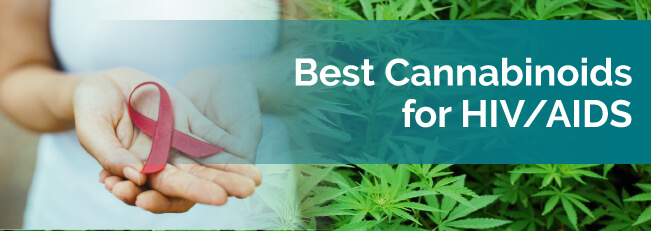
More than 60% of HIV/AIDS patients use medical marijuana to treat their symptoms. They’re really on to something — after all, patients who supplement their treatment with cannabis are 3.3 times more likely to keep their treatment working.
Marijuana has chemicals called cannabinoids similar to the endocannabinoids in your brain that impact all sorts of processes and systems. We’ve found more than 85 cannabinoids isolated from marijuana and about 500 in the plant itself. Every cannabinoid has unique benefits for your health.
So, when you use marijuana, it’s important to understand the chemical composition of your weed to determine how it will treat your symptoms. If you pick the right ratio, you can take advantage of the cannabis benefits you’re looking for.
Let’s look at how the two most well-known cannabinoids, CBD and THC, work to help HIV/AIDS patients. Most information about cannabinoids covers these two compounds, but other cannabinoids may have the potential to help. We have so much more to discover about the power of marijuana.
Cannabidiol, or CBD, has numerous benefits that can reduce the symptoms you experience from your illness and treatment. While it doesn’t directly treat your HIV/AIDS, it makes it easier to manage. It also doesn’t cause the psychoactive symptoms that THC does, making it a great choice for patients who don’t want to feel “high” off their medicine.
CBD helps patients with HIV deal with pain and difficulty sleeping. One of the most well-known healing properties of CBD and marijuana in general is their ability to relieve pain. While HIV doesn’t cause insomnia, the pain and night sweats can interrupt a good night’s sleep, so the sedative properties of CBD can help.
If a patient has progressed to having AIDS, CBD reduces those symptoms, too. It stimulates your appetite to counteract the rapid weight loss and appetite problems associated with AIDS. In addition, CBD treats the depression symptoms that many AIDS patients have.
The antiretroviral medication used for HIV/AIDS causes a variety of side effects difficult to manage. They often make the patient feel severely nauseous, which CBD can counteract with its antiemetic effects. It also compounds HIV/AIDS symptoms such as depression, pain and sleep issues.
While tetrahydrocannabinol can also treat the health issues associated with HIV/AIDS, it has promise for preventing the progression of the disease. Since we’re still searching for a cure for HIV/AIDS, this is great news.
In 2011, Molina et. al. conducted research to determine THC’s effect on macaques with simian immunodeficiency virus, the progenitor to HIV. The results gave them three different ideas for ways that THC helps inhibit virus progression. They speculated THC could reduce virus levels, soothe inflammation and maintain body weight.
We’ve also found research further supporting the notion that THC affects HIV cells. Some data indicates THC’s ability to reduce HIV-related inflammation is due to it preventing HIV from attaching to the subject’s cells. Researchers also think THC can stop HIV from replicating itself, which then prevents mutation and drug resistance.
The field of medical marijuana research is still building and growing due to cannabis’s illegality on a federal level. As regulations change, scientists can get more freedom to study marijuana and its healing properties.
If you’re just getting started learning about medical marijuana, you’ve come to the right place. We have a plethora of resources to answer every weed question you may have. Our directory of marijuana doctors can help you find someone to recommend cannabis medication, and our database of dispensaries can help you find somewhere to buy your medicine.